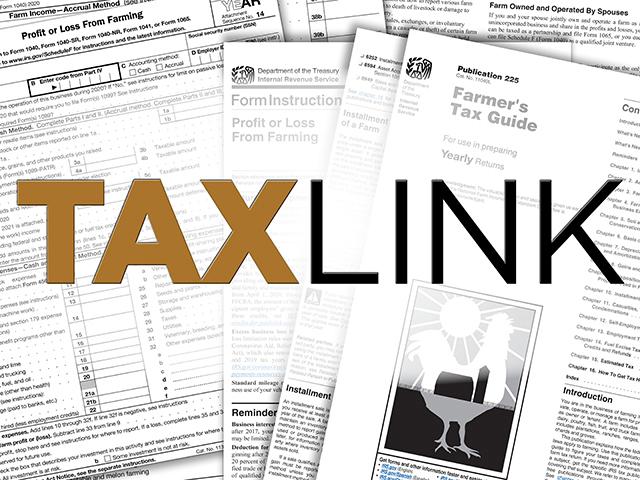Taxlink
Strategies for Section 179 and Bonus Depreciation
It's looking like another strong year for commodity prices. Even with higher input costs, many farmers may see substantial income. Come tax-planning time, they will be looking for opportunities to lower taxable income. With higher costs of prepaids and the 50% limitations, farmers might be limited in the amount of prepaids they can deduct. Deferred grain contracts can be used, but most of the 2022 income is coming from the 2021 crop or deferred contracts. What's left? Depreciation.
Today, we will look at Section 179 and bonus depreciation. Each has different pros and cons, but both are useful tools. Although I'll be looking at them through the eyes of the IRS, it's important to look at state-specific issues. Some states conform to IRS for Section 179 and bonus; other states partially conform or don't conform at all. This is important, because if your state requires an addback, you may have unexpected state taxable income.
Section 179 allows a taxpayer to elect to expense up to $1,080,000 (in 2022) of the cost of qualifying property instead of claiming depreciation. As a rule of thumb, assets with a depreciable life of three, five, seven, 10 or 15 years would qualify for Section 179. However, 20-year assets (sheds, barns, farmhouse) would not qualify for Section 179. There are restrictions on using Section 179 for vehicles, which I won't go into here.
One thing to be aware of: Section 179 expense can't exceed the aggregate business taxable income. Business taxable income includes Schedule C and Schedule F income, wages and sections 1231 and 1245 gains. It also includes income from partnerships and S Corporations if the taxpayer is actively involved. If the amount of Section 179 exceeds the business taxable income, the remaining Section 179 will be suspended until future years.
P[L1] D[0x0] M[300x250] OOP[F] ADUNIT[] T[]
There are some limitations that impact farmers. You can't take Section 179 on assets purchased from related parties. Section 179 is not available for trusts or estates. Only $1,080,000 can be used for Section 179, and it gets phased out starting at $2.7 million of asset purchases. Therefore, large farm operations may purchase too many assets to qualify.
Bonus depreciation can be used instead of or in addition to Section 179. Unlike Section 179, there is no limit to the amount of assets purchased or the amount of bonus depreciation taken. It also can be used for 20-year assets. If you plan on converting assets to personal use or contributing to a charitable remainder trust (CRT), you could avoid recapture income if you use bonus depreciation rather than Section 179. Another important difference is that bonus depreciation can be taken in excess of business taxable income resulting in net operating losses or potentially offsetting nonbusiness income such as land rent.
However, there are some pitfalls with bonus depreciation. Unlike Section 179, where you can pick assets and amount you expense, bonus depreciation is based on asset life, and it's an all-or-nothing election. That is, if you elect bonus depreciation on seven-year assets, you must take bonus on all seven-year assets you acquired during the year. That results in less flexibility.
Both Section 179 and bonus deprecation are great tools for farmers. However, it's important to understand what each one brings to the table. By looking at your objectives long term, you may find one more beneficial than the other.
**
-- Editor's Note: I wanted to clarify something I wrote a few months ago. In my S Corp article I said, "There are ordering rules that govern the taxability of distributions. If there is basis in the S Corp, distributions up to the basis are tax-free. If additional money is distributed, it would be treated as a taxable dividend to the extent of the accumulated adjustments account (AAA), thereafter treated as capital gains income." This is incorrect. I should have said, "additional money distributed is capital gains, unless the corporation was previously taxed as a C corp."
**
DTN Tax Columnist Rod Mauszycki, J.D., MBT, is a tax principal with CLA (CliftonLarsonAllen) in Minneapolis, Minnesota. Read Rod's "Ask the Taxman" column at https://www.dtnpf.com/… the-taxman. You may email Rod at taxman@dtn.com.
(c) Copyright 2022 DTN, LLC. All rights reserved.




